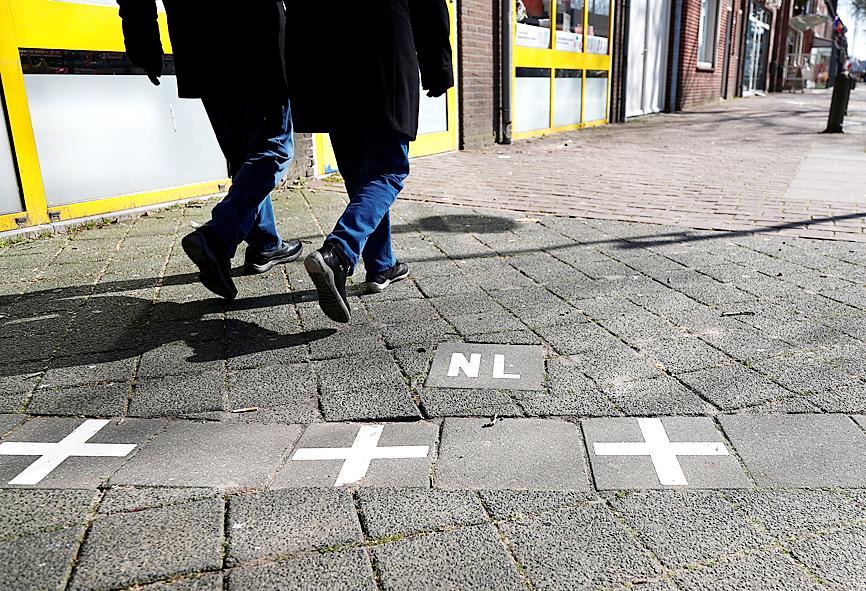Measures to halt the spread of COVID-19 have created an odd situation in a village straddling the Dutch-Belgian border, where opposite sides of the road are in different countries.
For decades residents have freely gone about their business barely noticing the dotted frontier on the ground, but now tougher lockdown rules in Belgium limit residents to food shops and pharmacies, while people in the Netherlands are also allowed to visit the shoe shop, travel agency and optician on their territory.
“These are all Dutch shops, but in Belgium they would have to be closed in this time of coronavirus,” Baarle-Hertog Mayor Frans de Bont said, pointing at a row of shops on a Dutch street section across from the Belgian municipality.

Photo: Reuters
“I live just 50m away, I walk by, but I cannot go into any of these shops because I am Belgian,” De Bont told reporters.
“We have extra police driving around, but we are calling for understanding from the public,” he said.
One store even had a ribbon down the middle of its premises, marking the border, with the Belgian section off-limits. Belgians are still allowed to go to food shops, a pharmacy or a doctor if they happen to be on Dutch territory.
The village and its surroundings are entirely within the Netherlands, but it also comprises 22 Belgian enclaves that form Baarle-Hertog and, within these, a further eight Dutch micro-enclaves, which belong to Dutch Baarle-Nassau. The border even bisects some properties.
De Bont said the quirky geography stemmed from a feudal system of land swaps and rentals that took place as much as 1,000 years ago and were left in place.
“It used to be very common, but it’s just here that it’s stayed,” he said, adding that efforts to establish a more regular border, including after World War I, had come to nothing.

With much pomp and circumstance, Cairo is today to inaugurate the long-awaited Grand Egyptian Museum (GEM), widely presented as the crowning jewel on authorities’ efforts to overhaul the country’s vital tourism industry. With a panoramic view of the Giza pyramids plateau, the museum houses thousands of artifacts spanning more than 5,000 years of Egyptian antiquity at a whopping cost of more than US$1 billion. More than two decades in the making, the ultra-modern museum anticipates 5 million visitors annually, with never-before-seen relics on display. In the run-up to the grand opening, Egyptian media and official statements have hailed the “historic moment,” describing the

‘CHILD PORNOGRAPHY’: The doll on Shein’s Web site measure about 80cm in height, and it was holding a teddy bear in a photo published by a daily newspaper France’s anti-fraud unit on Saturday said it had reported Asian e-commerce giant Shein (希音) for selling what it described as “sex dolls with a childlike appearance.” The French Directorate General for Competition, Consumer Affairs and Fraud Control (DGCCRF) said in a statement that the “description and categorization” of the items on Shein’s Web site “make it difficult to doubt the child pornography nature of the content.” Shortly after the statement, Shein announced that the dolls in question had been withdrawn from its platform and that it had launched an internal inquiry. On its Web site, Le Parisien daily published a

China’s Shenzhou-20 crewed spacecraft has delayed its return mission to Earth after the vessel was possibly hit by tiny bits of space debris, the country’s human spaceflight agency said yesterday, an unusual situation that could disrupt the operation of the country’s space station Tiangong. An impact analysis and risk assessment are underway, the China Manned Space Agency (CMSA) said in a statement, without providing a new schedule for the return mission, which was originally set to land in northern China yesterday. The delay highlights the danger to space travel posed by increasing amounts of debris, such as discarded launch vehicles or vessel

RUBBER STAMP? The latest legislative session was the most productive in the number of bills passed, but critics attributed it to a lack of dissenting voices On their last day at work, Hong Kong’s lawmakers — the first batch chosen under Beijing’s mantra of “patriots administering Hong Kong” — posed for group pictures, celebrating a job well done after four years of opposition-free politics. However, despite their smiles, about one-third of the Legislative Council will not seek another term in next month’s election, with the self-described non-establishment figure Tik Chi-yuen (狄志遠) being among those bowing out. “It used to be that [the legislature] had the benefit of free expression... Now it is more uniform. There are multiple voices, but they are not diverse enough,” Tik said, comparing it